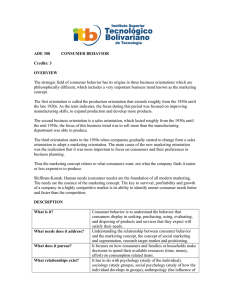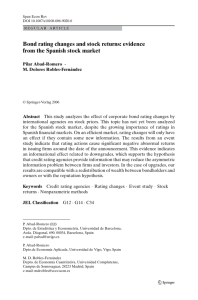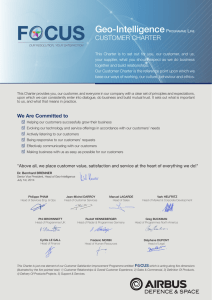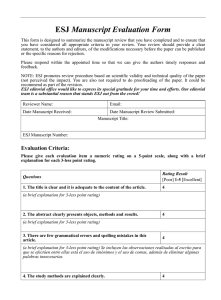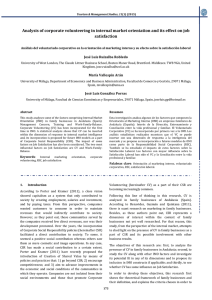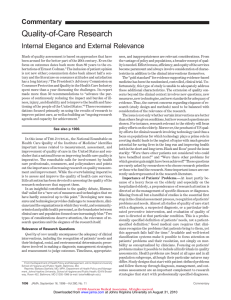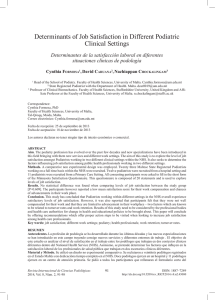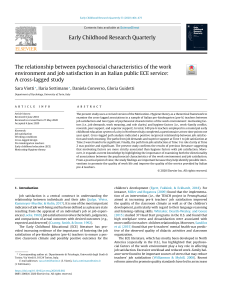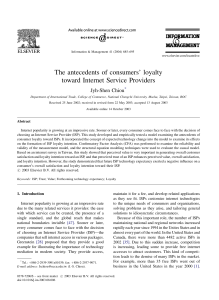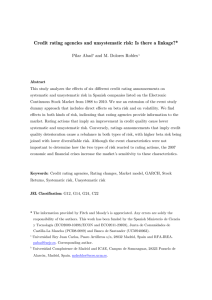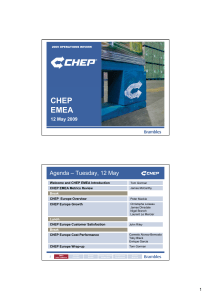The Impact Of Quality Standards And A Special Customer
Anuncio
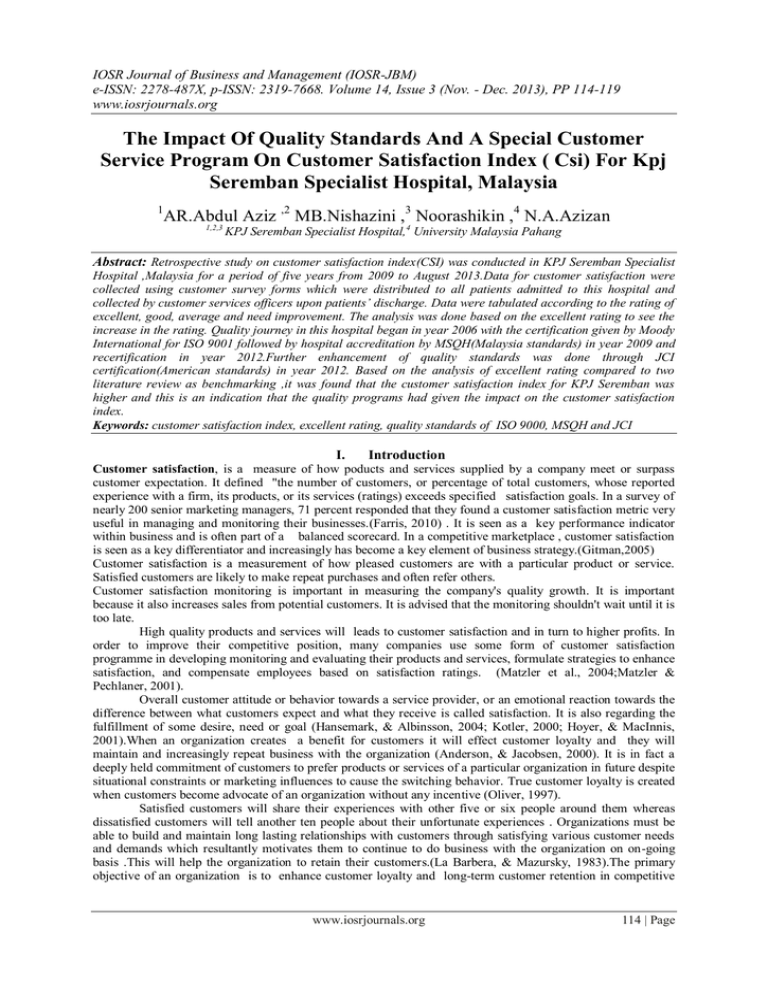
IOSR Journal of Business and Management (IOSR-JBM) e-ISSN: 2278-487X, p-ISSN: 2319-7668. Volume 14, Issue 3 (Nov. - Dec. 2013), PP 114-119 www.iosrjournals.org The Impact Of Quality Standards And A Special Customer Service Program On Customer Satisfaction Index ( Csi) For Kpj Seremban Specialist Hospital, Malaysia 1 AR.Abdul Aziz ,2 MB.Nishazini ,3 Noorashikin ,4 N.A.Azizan 1,2,3 KPJ Seremban Specialist Hospital,4 University Malaysia Pahang Abstract: Retrospective study on customer satisfaction index(CSI) was conducted in KPJ Seremban Specialist Hospital ,Malaysia for a period of five years from 2009 to August 2013.Data for customer satisfaction were collected using customer survey forms which were distributed to all patients admitted to this hospital and collected by customer services officers upon patients’ discharge. Data were tabulated according to the rating of excellent, good, average and need improvement. The analysis was done based on the excellent rating to see the increase in the rating. Quality journey in this hospital began in year 2006 with the certification given by Moody International for ISO 9001 followed by hospital accreditation by MSQH(Malaysia standards) in year 2009 and recertification in year 2012.Further enhancement of quality standards was done through JCI certification(American standards) in year 2012. Based on the analysis of excellent rating compared to two literature review as benchmarking ,it was found that the customer satisfaction index for KPJ Seremban was higher and this is an indication that the quality programs had given the impact on the customer satisfaction index. Keywords: customer satisfaction index, excellent rating, quality standards of ISO 9000, MSQH and JCI I. Introduction Customer satisfaction, is a measure of how poducts and services supplied by a company meet or surpass customer expectation. It defined "the number of customers, or percentage of total customers, whose reported experience with a firm, its products, or its services (ratings) exceeds specified satisfaction goals. In a survey of nearly 200 senior marketing managers, 71 percent responded that they found a customer satisfaction metric very useful in managing and monitoring their businesses.(Farris, 2010) . It is seen as a key performance indicator within business and is often part of a balanced scorecard. In a competitive marketplace , customer satisfaction is seen as a key differentiator and increasingly has become a key element of business strategy.(Gitman,2005) Customer satisfaction is a measurement of how pleased customers are with a particular product or service. Satisfied customers are likely to make repeat purchases and often refer others. Customer satisfaction monitoring is important in measuring the company's quality growth. It is important because it also increases sales from potential customers. It is advised that the monitoring shouldn't wait until it is too late. High quality products and services will leads to customer satisfaction and in turn to higher profits. In order to improve their competitive position, many companies use some form of customer satisfaction programme in developing monitoring and evaluating their products and services, formulate strategies to enhance satisfaction, and compensate employees based on satisfaction ratings. (Matzler et al., 2004;Matzler & Pechlaner, 2001). Overall customer attitude or behavior towards a service provider, or an emotional reaction towards the difference between what customers expect and what they receive is called satisfaction. It is also regarding the fulfillment of some desire, need or goal (Hansemark, & Albinsson, 2004; Kotler, 2000; Hoyer, & MacInnis, 2001).When an organization creates a benefit for customers it will effect customer loyalty and they will maintain and increasingly repeat business with the organization (Anderson, & Jacobsen, 2000). It is in fact a deeply held commitment of customers to prefer products or services of a particular organization in future despite situational constraints or marketing influences to cause the switching behavior. True customer loyalty is created when customers become advocate of an organization without any incentive (Oliver, 1997). Satisfied customers will share their experiences with other five or six people around them whereas dissatisfied customers will tell another ten people about their unfortunate experiences . Organizations must be able to build and maintain long lasting relationships with customers through satisfying various customer needs and demands which resultantly motivates them to continue to do business with the organization on on-going basis .This will help the organization to retain their customers.(La Barbera, & Mazursky, 1983).The primary objective of an organization is to enhance customer loyalty and long-term customer retention in competitive www.iosrjournals.org 114 | Page The Impact Of Quality Standards And A Special Customer Service Program On Customer markets requires the supplier to go beyond mere basic satisfaction and to look for ways of establishing ties of loyalty that will help ward off competitor attack (Clarke, 2001). Customer satisfaction is the key aim in selling process. It is estimated that it costs five times as much to attract new customers as to retain an existing one. The relationship between the customer and the organization is very important. Customer satisfaction refers to the extent to which customers are happy and satisfied with the products and services provided by a business. Consumer satisfaction is important because when a customer is happy with a service or goods provider, they are most likely to be loyal and to make repeat orders and to use a wide range of services offered by a business. This will boost business sales. Customers are the end users of products and services produced by any company and customer satisfaction is extremely important in increasing profit margins as well as customer retention. If you satisfy your customers they will be more likely to come back and also bring their friends. In today's economy, the customer is king, and most have adopted the attitude of "If I or my company choose to spend money with you, you have to earn it." The result is that in virtually every industry, a multitude of businesses offering similar products and services are now zealously competing on price, quality, quantity and just about anything else they can offer. Customer service pays. It does not cost. But it does mean everyone in the organization has to get involved. Whatever the size or nature of your business, whatever your role in the company, you're involved in customer service. How you react then, will have an effect on everything your company is trying to achieve because everyone is an ambassador for the organization. The management guru, Peter Drucker states, "The purpose of a business is to create and retain customers." So where do you start? Following are seven customer service tips that can help ensure your organization is, indeed, providing superior customer service that will pretty much guarantee a high retention rate. In today's economy, the customer is king, and most have adopted the attitude of "If I or my company choose to spend money with you, you have to earn it." The result is that in virtually every industry, a multitude of businesses offering similar products and services are now zealously competing on price, quality, quantity and just about anything else they can offer. Customer Service Index is a rating system utilized by auto manufacturers based upon the overall consumer purchasing or service experience at the dealership and varies among manufacturers. The Customer Satisfaction Index (CSI) is also called customer service index. It is an important way to gauge how your organization ranks compared to your competitors and identify areas where you can develop your service/product delivery to keep your customers happier, for longer. The CSI will help to increase bottom line performance, profitability, increased efficient use of resources, retaining customers for longer and earning their trust, lower costs per customer acquisition, customer endorsements and recommendations, employee satisfaction and reputation. The Customer Satisfaction (CSAT) Index is a fast and effective survey solution that can help you understand and act on customer feedback. Your expertise and commitment to providing high levels of customer service can help ensure ongoing business success for you and your customers. Understanding what drives customer satisfaction and loyalty is crucial to your organization’s continued success. Customer insight can help you retain and deepen your relationships with your customers. It can also help you drive profitability through reduced sales costs and recurring revenue. Hospitals must focus on customer demands for consistency and meeting needs, for clear for clear policies regarding service quality, and for up-to date medical treatment and service quality (Tang and Cheng, 2001; Harris and Ralph, 1999). The Swedish Customer Satisfaction Barometer (SCSB) model established in 1989 was the first Customer Satisfaction Index Model pertaining to purchased and consumed products and services (Fornell,1992).Many empirical studies have shown that customer satisfaction secures future revenues (Bolton, 1998; Fornell,1992), reduces future transactions costs (Reichheld and Sasser, 1990), decreases price elasticity (Anderson,1996), and minimizes the likelihood of customers defecting if quality falters (Anderson and Sullivan, 1993). OBJECTIVES 1. To monitor customer satisfaction index for a period of five years in KPJ Seremban 2. To see the impact of quality standards such as ISO 9001, hospital accreditation standards such as MSQH(Malaysian standards) and Joint Commission International (American standards) on customer satisfaction index of KPJ Seremban. II. Methodology Retrospective study was done to collect data on customers satisfaction for a period of five years from 2009 to August 2013. Data on customers satisfaction was collected using customer service forms which were given to all patients admitted to KPJ Seremban Specialist Hospital. Those forms will be collected back by customer service officers upon patient’s discharge from wards. Data collected will be analyzed and later www.iosrjournals.org 115 | Page The Impact Of Quality Standards And A Special Customer Service Program On Customer tabulated to see the trending. Data will be tabulated according to nursing, doctors, rooms, food and your care based on the rating of Excellent, good, average and need improvement. III. Results www.iosrjournals.org 116 | Page The Impact Of Quality Standards And A Special Customer Service Program On Customer IV. Discussion The quality journey in KPJ Seremban began in year 2006 when this hospital had been certified by Moody International for ISO 9001:2000 certification and further recertified for the new edition of ISO 9001:2008 in year 2008.For ISO standards , healthcare providers are required to comply to the following requirements to meet customers need such as providing facilities for customers feedback and to handle customers complaint,evaluation of vendors supplying goods and drugs to meet customers need, each services are required to meet their yearly quality objectives to improve services to customers such as waiting time for delivering services and to monitor performances of outsource vendors in meeting customers need. Auditing by Moody will be done on yearly basis to ensure the hospital meet the standards. In year 2009 KPJ Seremban was accredited by MSQH, the Malaysian hospital accreditation body .The certification valid for three years and in year 2012 the hospital was reaccredited for the second cycle by MSQH. In this standards the healthcare providers are required to comply to the following standards in meeting customers need such as ensuring safety for patients,healthcare providers and visitors.This can be done by complying to the requirements sets for building,medical equipments and other facilities.Hospital is required to form patient complaint and conflict resolution committee to ensure all complaints and grievances are handled accordingly.Data on customers feedback must be collected and discussed with this committee for continuous improvement.Healthcare providers are required to provide patient’s education not only to the patient but also to the carer to ensure patients and family understand the process of treatment.Safety and quality improvement must be programmed in a structured manner to meet patient’s need. The outcome of physicians are monitored to ensure quality services are provided for patients. Actions will be taken accordingly when physicians are not meeting the set target.Engaging the right staff and physicians are important to meet patient’s need . This is done www.iosrjournals.org 117 | Page The Impact Of Quality Standards And A Special Customer Service Program On Customer through proper credentialling and privileging of staff and physicians and their competencies are monitored continuously. To further enhance the quality of services , KPJ Seremban was accredited by the Joint Commission International (JCI) which is an American based hospital standards. In this standards, hospital is required to comply to 13 chapters to ensure the organization can meet patient’s need. Hospital must have a proper arrangement for patients to get excess to the services,right assessments are done, the delivery of care must be uniform and continuous to ensure customers need are met.The hospital is required to protect and promote patient’s right.Patients and family are involved in decision making .Staff are educated accordingly so that they know patients and family right.The organiztion is required to provide education not only to patients but also to their family so that they can make the right decision.Proper communication to patients and family is required to be provided by the hospital . The organization must ensure a proper program to prevent and control infection to ensure patients and family are safe during their hospital stay.The facilities provided must be safe for patients, healthcare providers and visitors by complying to the set standards and the local laws and regulations. Through the implementaion of the ISO 9001:2008, MSQH and JCI standards we can see the improvement of customer satisfaction index. For nursing services in year 2009, the excellent rating was 33% and increased to 61% in year 2013.The good rating was 62% in year 2009 but reduced to 37% in year 2013 . This is because of the increase in the rating of excellent. Therefore the excellent rating increased by 28% from year 2009 to year 2013. Services provided by doctors received a rating of 42% in year 2009 and increased to 67% in year 2013. The rating on good was 57% in year 2009 but reduced to 32% in year 2013.The reduction was due to the increase in the rating of excellent.Excellent rating for doctors increased by 25% from year 2009 to year 2013.In term of room facilities, for year 2009 the excellent rating was 40% but increased to 52%. The rating for good was 50% in year 2009 but reduced to 44% in year 2013 due to the increase in the rating for excellent.Excellent rating for room increased by 12% for the five years period of 2009 to 2013.Rating for food also increased from 30% excellent rating in year 2009 to 43% in year 2013. Due the increase in the rating of excellent the rating for good reduced from 60% in year 2009 to 49% in year 2013.Food rating in term of excellent rating increased by 13% from year 2009 to year 2013.Excellent rating in term of hospital care increased from 33% in year 2009 to 62% in year 2013. Rating for good reduced from 62% in year 2009 to 35% in year 2013. The increase of excellent rating for hospital care from year 2009 to year 2013 was 29%. Patient satisfaction survey conducted by A.C Nielsen (ORG Marg) shows that the overall satisfaction index or eQ index has increased from 79 in the first survey in March 2007 to 84 in the second Phase in February 2008 with an increase of 5%.In a another study it was found that the satisfaction with hospital care--inpatient, outpatient and emergency services was ranked at 78 where satisfaction rose by 2.6 percent. V. Conclusion Based on the data of KPJ Seremban from 2009 to 2013 it was found that the increase in the excellent rating for nursing was 28%, 25% for doctors, 12% for food , 13% for room facilities and 29% for patient care. As an average ,the yearly increase for nursing was 5%, 5.6% for doctors , 2.6% for food, 2.4% for room and 5.8% for patient care .Therefore when compared to the study conducted by A.C Nielson ,the rating for doctors and patient care were slightly higher but the rating for nursing was the same. However for food and room the rating were lower .When compared to another study conducted by fierce healthcare ,the rating achieved in KPJ Seremban were much higher except for food which is the same with fierce healthcare but for room it was slightly lower at 2.4%.Therefore we can conclude that the implementation of quality standards of ISO 9001, MSQH and JCI had improved the customer satisfaction index for KPJ Seremban at the rate which is at par with other international studies. Literatures [1]. [2]. [3]. [4]. [5]. [6]. [7]. [8]. [9]. http://www.ask.com/question/what-is-customer-satisfaction http://www.ask.com/question/why-it-is-important-to-monitor-customer-satisfaction-and-how-to-do-so Matzler, K., Bailom, F., Hinterhuber, H. H., Renzl, B. & Pichler, J. (2004) The asymmetric relationship betweenattribute-level performance and overall customer satisfaction: a reconsideration of the importance-performance analysis, Industrial Marketing Management, 33(May), pp. 271–277. Matzler, K. & Pechlaner, H. (2001) Guest satisfaction barometer and benchmarking: experiences from Austria,Journal of Quality Assurance in Hospitality and Tourism, 2(3/4), pp. 25–47. Hansemark, O. C. & Albinson, M. (2004). Customer Satisfaction and Retention: The Experiences of Individual Employees. Managing Service Quality, 14 (1), 40-57 Hoyer, W. D., & MacInnis, D. J. (2001). Consumer Behaviour. 2nd ed., Boston: Houghton Mifflin Company. Kandampully, J., & Duffy, R. (1999). Competitive Advantage through Anticipation, Innovation and Relationships. Management Decision, 37 (1), 5156. Anderson, H., & Jacobsen P. N. (2000). Creating Loyalty: Its Strategic Importance in Your Customer Strategy. In S. A. Brown (ed.), Customer Relationship Management (pp. 55-67). Ontario: John Wiley Oliver, R. L. (1997). Satisfaction: A Behavioral Perspective on the Consumer. New York: McGraw Hill. LaBarbera, P. A., & Mazursky, D. (1983). A Longitudinal Assessment of Consumer Satisfaction, Dissatisfaction: the Dynamic Aspect of Cognitive Process. Journal of Marketing Research, 20, 393-404. www.iosrjournals.org 118 | Page The Impact Of Quality Standards And A Special Customer Service Program On Customer [10]. [11]. [12]. [13]. [14]. [15]. [16]. [17]. [18]. [19]. [20]. [21]. [22]. [23]. [24]. [25]. [26]. [27]. Clarke, K. (2001). What Price on Loyalty When a Brand Switch is Just a Click Away?,. Qualitative Market Research: An International Journal, 4 (3), 160-168. Farris, Paul W.; Neil T. Bendle; Phillip E. Pfeifer; David J. Reibstein (2010). Marketing Metrics: The Definitive Guide to Measuring Marketing Performance. Upper Saddle River, New Jersey: Pearson Education, Inc. ISBN 0-13-705829-2. Gitman, Lawrence J.; Carl D. McDaniel (2005). The Future of Business: The Essentials. Mason, Ohio: South-Western. ISBN 0-32432028-0. http://www.ask.com/question/why-is-customer-satisfaction-so-important http://www.successimages.com/articles/sw03.htm http://www.lbausa.com/programs/auto-program/glossary-of-terms/ http://customerservicemeasurement.com/services/research/customer-service-index https://mspartner.microsoft.com/en/uk/pages/sales%20and%20marketing/customer-satisfaction-index.aspx REF: Tang LL, Cheng PJ (2001) The quality survey on medical service by using Kano two-dimensional model. J. Chinese Instit. Ind. Eng.,18(2):71-81. Harris LE, Ralph WS (1999). Measuring patient satisfaction for quality improvement. Med. Care., 37(12):1207-1213. Fornell C (1992). A national satisfaction barometer: the Swedish experience. J. Mark., 56(1):6-21. Bolton RN (1998). A dynamic model of the duration of the customer’s relationship with a continuous service provider: the role of customer satisfaction. Mark. Sci., 17(1):45-65. Fornell C (1992). A national satisfaction barometer: the Swedish experience. J. Mark., 56(1):6 -21. Reichheld FF, Sasser WE (1990). Zero defections: quality comes to services. Harv. Bus. Rev., 68(5):105-111 Anderson EW (1996). Customer satisfaction and price tolerance. Mark. Lett., 7(3):19-30 Anderson EW, Sullivan M (1993). The antecedents and consequences of customer satisfaction for firms. Mark. Sci., 12(2):125-143. www.fiercehealthcare.com/story/hospitals-lose-docs-offices-consumer-satisfaction/2013-04-16 http://tatamainhospital.com/hospital-info/customer-services.asp www.iosrjournals.org 119 | Page
